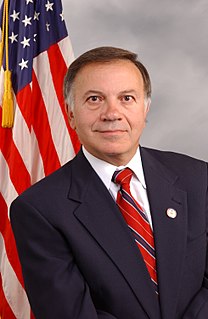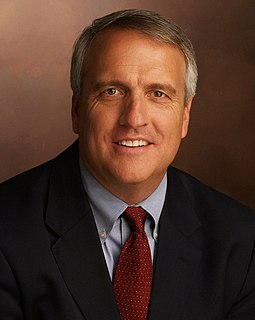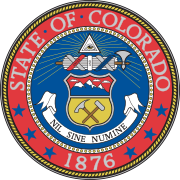
Thomas Gerard Tancredo is an American politician from Colorado, who represented the state's sixth congressional district in the United States House of Representatives from 1999 to 2009 as a Republican. He ran for President of the United States during the 2008 election, and was the Constitution Party's unsuccessful nominee for Governor of Colorado in 2010.

California Proposition 187 was a 1994 ballot initiative to establish a state-run citizenship screening system and prohibit undocumented immigrants from using non-emergency health care, public education, and other services in the State of California. Voters passed the proposed law at a referendum on November 8, 1994. The law was challenged in a legal suit the day after its passage, and found unconstitutional by a federal district court on November 11. In 1999, Governor Gray Davis halted state appeals of this ruling.

The Immigration Reform and Control Act was passed by the 99th United States Congress and signed into law by US President Ronald Reagan on November 6, 1986.
Immigration reform in the United States is a term used in political discussion regarding changes to current immigration policy of the U.S.
In law, an alien is a person who is not a citizen or national of a given country, though definitions and terminology differ to some degree depending on the continent or region of the world. The term "alien" is synonymous to "foreign national".

The Colorado gubernatorial election of 2006 was held on November 7, 2006. Incumbent Republican governor Bill Owens was unable to run due to term limits, and the election was won by Democratic nominee Bill Ritter.
Illegal immigration to the United States is the process of migrating into the United States in violation of federal immigration laws. This can include foreign nationals who have entered the United States illegally, as well as those who entered legally but then remained after the expiration of their entry visa or parole documents. Illegal immigration has been a matter of intense debate in the United States since the 1980s.
The Comprehensive Immigration Reform Act was a United States Senate bill introduced in the 109th Congress (2005–2006) by Sen. Arlen Specter [PA] on April 7, 2006. Co-sponsors, who signed on the same day, were Sen. Chuck Hagel [NE], Sen. Mel Martínez [FL], Sen. John McCain [AZ], Sen. Ted Kennedy [MA], Sen. Lindsey Graham [SC], and Sen. Sam Brownback [KS].

Referendum K is a referendum on the 2006 Colorado ballot. It "directs the Colorado attorney general to initiate, or join other states in, a lawsuit against the U.S. attorney general to demand that the federal government enforce existing federal immigration laws".1

Illegal immigration refers to the migration of people into a country in violation of the immigration laws of that country, or the continued residence of people without the legal right to live in that country. Illegal immigration tends to be financially upward, from poorer to richer countries. Illegal residence in another country creates the risk of detention, deportation, and/or other sanctions.

Referendum E was a 2006 referendum in Colorado to reduce property taxes for qualified disabled veterans by exempting a portion of the value of their home from property taxation. Voters approved the referendum 78% to 22%. A qualified disabled veteran would have a service-connected disability with a 100 percent permanent disability rating.It was approved by the electorate and became Article X Section 3.5 of the state constitution. Subsequent enabling legislation in 2007 removed military disability retirements as a recognized eligibility, leaving only disability ratings of the US Department of Veterans Affairs. No similar provision has been made for survivors of active duty military who die in the line of duty.
Unreported employment, working under the table, off the books, cash-in-hand, illicit work, or moonlighting, is illegal employment that is not reported to the government. The employer or the employee often does so for tax evasion or avoiding or violating other laws. The working contract is made without social security costs, and does typically not provide health insurance, paid parental leave, paid vacation or pension funds. It is a part of what has been called the underground economy, shadow economy, black market or the non-observed economy.
Buckley v. American Constitutional Law Foundation, Inc., 525 U.S. 182 (1999), was a United States Supreme Court case that dealt with the authority of states to regulate the electoral process, and the point at which state regulations of the electoral process violate the First Amendment freedoms.
"Nannygate" is a popular term for the 1993 revelations that caused two of President Bill Clinton's choices for United States Attorney General to become derailed.
There are thought to be over half a million Undocumented immigrants in New York City. They come from many parts of the world, especially Latin America, Asia, Eastern Europe, and the Caribbean. About 70% of them have paid work, in catering, construction, retail, driving, cleaning, and many other trades; at least in catering, their wages tend to be lower than those of comparable workers. City regulations restrict public officials and police officers from enquiring about immigration status of residents with whom they come into contact.
The economic impact of undocumented immigrants in the United States is challenging to measure, and politically contentious. Research shows that illegal immigrants increase the size of the U.S. economy/contribute to economic growth, enhance the welfare of natives, contribute more in tax revenue than they collect, reduce American firms' incentives to offshore jobs and import foreign-produced goods, and benefit consumers by reducing the prices of goods and services. Economists estimate that legalization of the undocumented immigrant population would increase the immigrants' earnings and consumption considerably, and increase U.S. gross domestic product.
Chamber of Commerce v. Whiting, 563 U.S. 582 (2011), is a decision by the Supreme Court of the United States that upheld an Arizona state law suspending or revoking business licenses of businesses that hire illegal aliens.
The Georgia Security and Immigration Compliance Act requires that all public employers, contractors and subcontractors register and comply with the federal work authorization program operated by the United States Department of Homeland Security to verify new employee work eligibility.

The Victims of Immigration Crime Engagement (VOICE) Office is a U.S. government agency established within the Department of Homeland Security under the Trump administration in February 2017. President Donald Trump directed it be established by Executive Order 13768.







